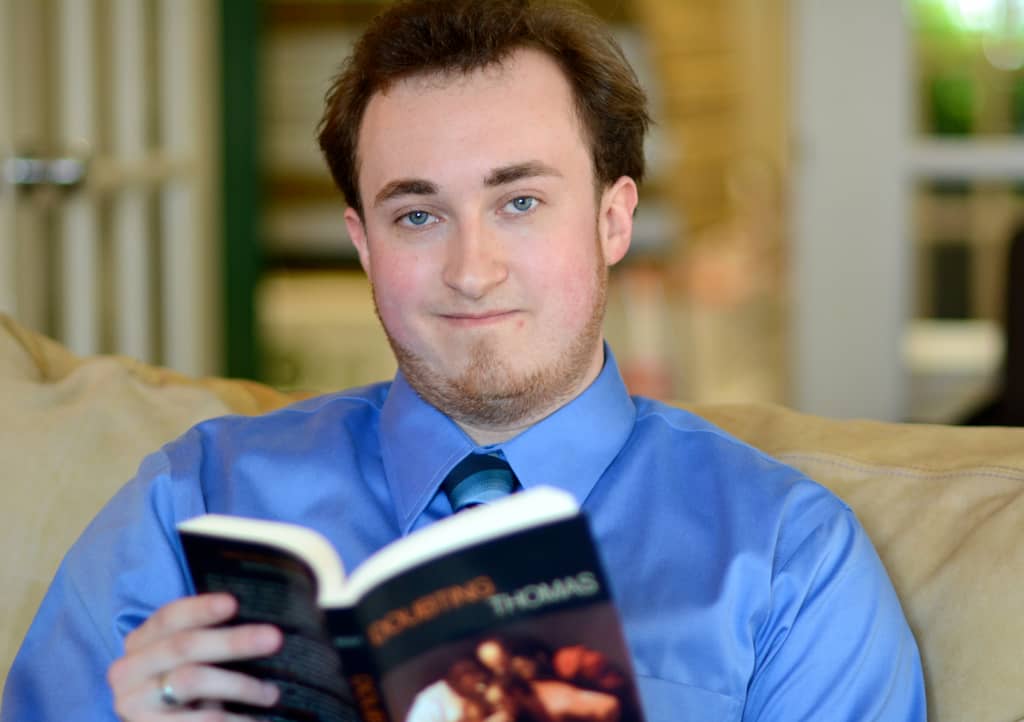John Parrett Excels in Role of Religious History Scholar
A snowstorm in 2014 indirectly gave John Parrett the opportunity to engage in two of his favorite activities a year later: teaching students and sharing his passion for religious history.
Parrett will be a senior this fall at Wilmington College majoring in religion and philosophy, and history, with a minor in business management.
In winter 2014, he had a research paper, “Wisdom and the Living One,” accepted for scholarly presentation at the Society of Biblical Literature’s regional conference in Illinois. It was based on a 30-page research paper he prepared at WC titled “Thomas and John: The Doubting and Beloved Disciples.”
Plans were thwarted for him to speak about his research when inclement weather prevented Parrett and Dr. Stephen Potthoff, associate professor of religion and philosophy, from making the trek for the meeting.
A unique opportunity this spring countered that bit of misfortune when Parrett was approved to teach a seminar through WC’s Wilmington Institute for Lifelong Learning (WILL), a semiannual offering of nearly two dozen courses designed for older adults in the community.
It was unprecedented for an undergraduate student, but WILL’s director, with Potthoff’s endorsement and support, felt Parrett, who aspires to be a college professor, possessed both a mastery of his topic and the ability to teach it.
“I’ve always been interested in religion, the scientific study of religion,” he said. “I’m not a theologian. Theologians study God. I study religion, man’s interpretation of God.”
Parrett said the study of religion provides a view of society’s evolution — “and how we think as a people.”
Potthoff established a continuing independent study course in which he has been teaching Parrett biblical Greek, a skill the student used in translating the “Doubting Thomas” passage from the Gospel of John. Subsequently, Parrett actually came up with his own hypothesis that, in some ways, counters much of the prevailing thought since the Gospel of Thomas was uncovered in Egypt in 1945.
Many are familiar with the Gospel of John and the story of the doubting disciple, Thomas, but Parrett said, “few have heard Thomas’ view of Jesus and, those that have heard Thomas’ view, say the Gospels of Thomas and John are nothing alike.
“I have come to a different conclusion,” he added. “It seems to me that the authors have much more in common.”
Parrett’s conclusions come in part from his own translations of the biblical Greek interpretations of the Gospel.
The story of doubting Thomas finds the resurrected Jesus Christ appearing at a secret meeting of the disciples. “Peace be with you,” he told them. “Receive the Holy Spirit.”
Thomas was not present and questioned the veracity of the apostles’ proclamation that they had seen the lord. Days later, Jesus reappeared and Thomas insisted upon seeing physical evidence proving that it was indeed Christ — namely the wounds to his wrists and side.
Jesus complied but said, “Blessed are those believing and not seeing” in reference to those with faith and the doubting Thomas.
Parrett’s WILL course is based upon his paper, which he has been expanding with expectations that it ultimately will become a doctoral thesis. His poster presentation on “Thomas and John” earned him a Best of Class award at WC’s recent Student-Faculty Research Forum.
“I very much enjoy teaching and I want to teach and share my ideas,” he said. “If you can explain something to someone, you’ll know you’re on the right track — that teacher-student collaboration is important.”
Indeed, Parrett credits Potthoff with helping fuel his passion for religion and history — and teaching.
“I’ve really enjoyed having the one-on-one time with Stephen working on the Greek,” he said, noting he will need to learn Greek, Latin, Hebrew, French, German and Coptic in graduate school.
“I enjoy it here at Wilmington College, especially the one-on-one time I get with professors. I don’t think I would have gotten that to this extent at any other school.”
Potthoff has been thrilled to have a student so passionate about studying religion and history — and possessing the ambition to teach it.
“He’s the first student that’s taken me up on my offer to teach them biblical Greek,” he said, noting that while observing Parrett instruct a WILL class, he found him comfortable in the role of a teacher.
“He’s fascinated with the subject matter and he enjoys staking out his position. John’s also a historian, constructing a compelling story from these early documents,” he added. “He’s really coming into his own as a scholar.”
In fact, the WILL course proved such a good experience, Parrett will instruct two this fall, one on the role of gender and sexuality in the Bible and another covering the Book of Revelation from when it was written through its modern interpretations.
